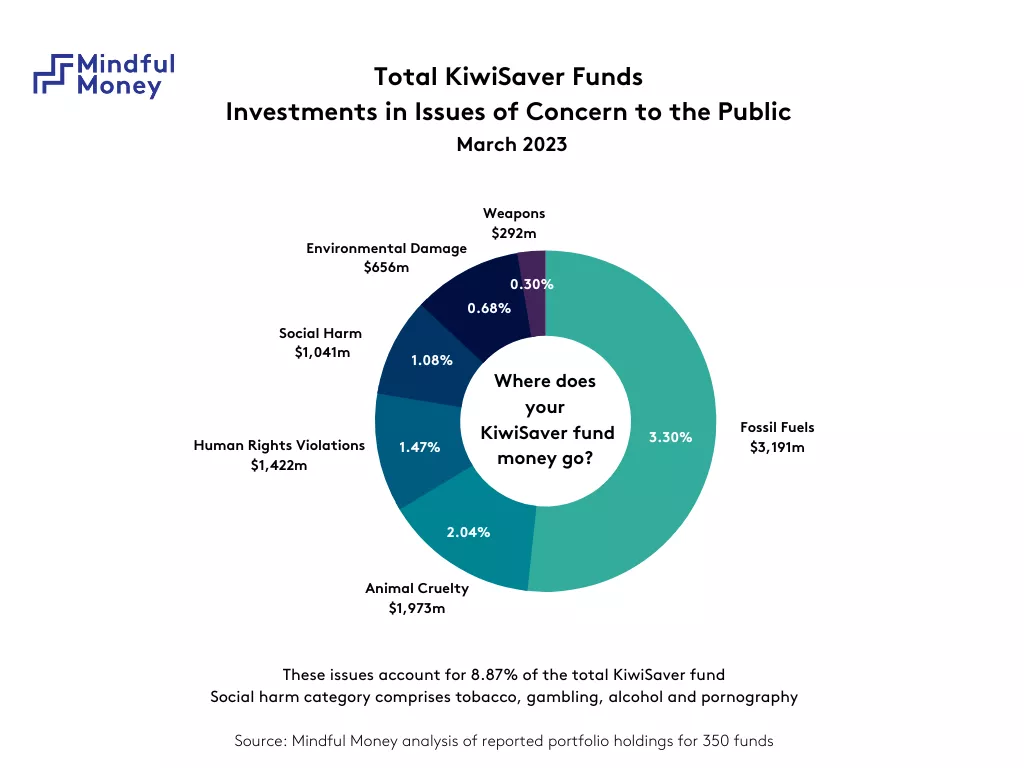Learn
What KiwiSaver schemes are invested in (March 2023)
30th Aug. 2023
New data analysis from charity Mindful Money shows that Kiwisaver investments in companies the public want to avoid have hit record levels. Across all KiwiSaver funds, there is $8.6 billion of funds invested in issues that the public want to avoid. This amounts to 8.9% of total KiwiSaver funds.
Analysis shows record level of investments in companies causing harm

New data analysis from charity Mindful Money shows that Kiwisaver investments in companies the public want to avoid have hit record levels. Across all KiwiSaver funds, there is $8.6 billion of funds invested in issues that the public want to avoid. This amounts to 8.9% of total KiwiSaver funds.
Kiwis have been clear in annual surveys that they do not want to invest in companies that cause harm to the climate, to the environment, to animals and to society. Yet many funds continue to invest in those companies of concern.
Barry Coates, Founder and CEO of Mindful Money commented: “The level of KiwiSaver investment in harmful companies has never been higher. While most KiwiSaver providers say they are investing responsibly or using an ESG (Environmental, Social and Governance) framework, only a few funds are comprehensively avoiding investments in harmful companies. Most are continuing to invest a significant proportion of the public’s funds in issues that Kiwis want to avoid.”
Some funds invest in companies causing harm and then use their shareholder power to make changes. But all too often, this ‘stewardship’ approach does little to justify continued investment in harmful companies. There are still only a few fund managers who can show significant results from their engagement activity, and few have a credible pathway to sell their shares if harmful impacts continue.
Fossil fuel investment by KiwiSaver funds is now at a record level of $3.2 billion. Despite their promises to transition to renewable energy, most of the oil and gas producers are still expanding their exploration and field development.
Mindful Money’s recent report showed that companies like Shell, BP, Exxon and Chevron have been stringing investors along with greenwash, promising a transition to clean energy when in fact most of their capital expenditure is going into their core fossil fuels business.
Barry Coates commented: “During this climate crisis, Kiwis should be appalled that the amount their KiwiSaver funds have invested in companies expanding their fossil fuel production has more than doubled over the eighteen months to March 2023.”
Mindful Money’s website identifies the fossil fuel companies that are expanding. Barry Coates commented: “KiwiSaver investors with holdings in those companies should be aware their funds are contributing to the climate crisis.
“These companies are not only destroying the climate, but are a poor financial investment. Their shares have, on average, lost money over the past decade and they face growing losses from stranded assets as their core business declines.
“Meanwhile KiwiSaver fund providers have been investing far less in renewable energy developers and the companies in transition on a 1.5 degrees C pathway.
“KiwiSaver investors should ask their providers for an explanation or consider switching to a fund that invests ethically, in renewable energy and other climate solutions.”
The second highest investment of $2 billion is in companies that practise animal cruelty, including products tested on animals (for reasons other than human health), factory farming, fur and the use of animals for entertainment.
The highest issue of concern to members of the public is companies that commit human rights violations, including labour rights violations, trafficking and violence against civilians. A total of $1.4 billion is invested in companies such as Meta (digital harm and breaches of privacy), the mining company Rio Tinto (community harm) and Johnson & Johnson (product safety).
There is KiwiSaver investment of just over $1 billion in the category of social harm, including alcohol companies such as Diageo plc, pornography, gambling and tobacco.
“It is now 8 years since there was a public outcry over the amount of KiwiSaver funds in tobacco. The latest data shows an annual growth of 50% in investments in tobacco companies such as Philip Morris, British American Tobacco and Imperial Brands, to more than $21 million.”
There is also $292 million in weapons companies, including nuclear weapons producers, such as BAE and Lockheed Martin, and handgun producers and retailers.
Consumers have a right to know about their investments
Mindful Money provides free information to the public on the ‘companies of concern’, the issues that consumers most want to avoid.
Barry Coates commented: “There should be more transparency in the KiwiSaver scheme. Few KiwiSaver providers reveal the full list of companies they invest in and none identify the companies that are likely to be of concern to the public. People have a right to know. Many people using the Mindful Money website are shocked to find out what companies they are invested in.”
“The investment sector appears to be an outlier. Retailers of most consumer products are acutely aware of their customers’ concerns. However, KiwiSaver providers rarely provide their customers with information about the consequences of their investment decisions. This should be common practice in an era of growing concern over climate change, the environment and social equity.”
Notes for Editors
Mindful Money is a charity dedicated to promoting ethical and impact investing in New Zealand. Its mission is to empower individuals and the finance sector to drive positive change through ethical investment and contribute to a sustainable future for all. Around 230,000 Kiwis have used Mindful Money’s research. www.mindfulmoney.nz
The annual survey of the New Zealand public for 2023, commissioned by Mindful Money and the Responsible Investment Association of Australasia (RIAA) shows that the public wants to avoid the following types of investment:
- Human rights violations 90%
- Environmental damage 88%
- Animal cruelty 85%
- Weapons 80%
- Fossil Fuels 75%
- Social Harm* 69-74%
*Social harm includes pornography, tobacco, gambling and alcohol.

